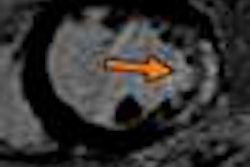Ultrasound has revealed that long-term exposure to air pollution may lead to heart attacks and strokes by speeding up atherosclerosis, according to research published this week in PLOS Medicine.
As part of the Multi-Ethnic Study of Atherosclerosis and Air Pollution (MESA Air), a multi-institutional team performed ultrasound measurements of the blood vessels on 5,362 people (age range, 45-84 years) on two occasions separated by about three years. They found that higher concentrations of fine particulate air pollution (PM2.5) at the home were linked to a faster thickening of the inner two layers of the common carotid artery. In addition, reductions of fine particular air pollution over time were linked to slower progression of the blood vessel thickness (PLOS Med, April 23, 2013).
After adjusting for other factors such as smoking, the researchers also discovered that the thickness of the carotid vessel increased by 14 µm each year. However, the vessels of people exposed to higher levels of residential fine particular air pollution thickened faster than others living in the same metropolitan area, according to the authors.
The research was led by Sara Adar, the John Searle assistant professor of epidemiology at the University of Michigan School of Public Health, and Dr. Joel Kaufman, a professor of environmental and occupational health sciences and medicine at the University of Washington.
If the study's results are confirmed by future analyses of the full 10 years of follow-up in this patient cohort, the findings will help to explain associations between long-term PM2.5 concentrations and clinical cardiovascular events, Adar said in a statement.



















